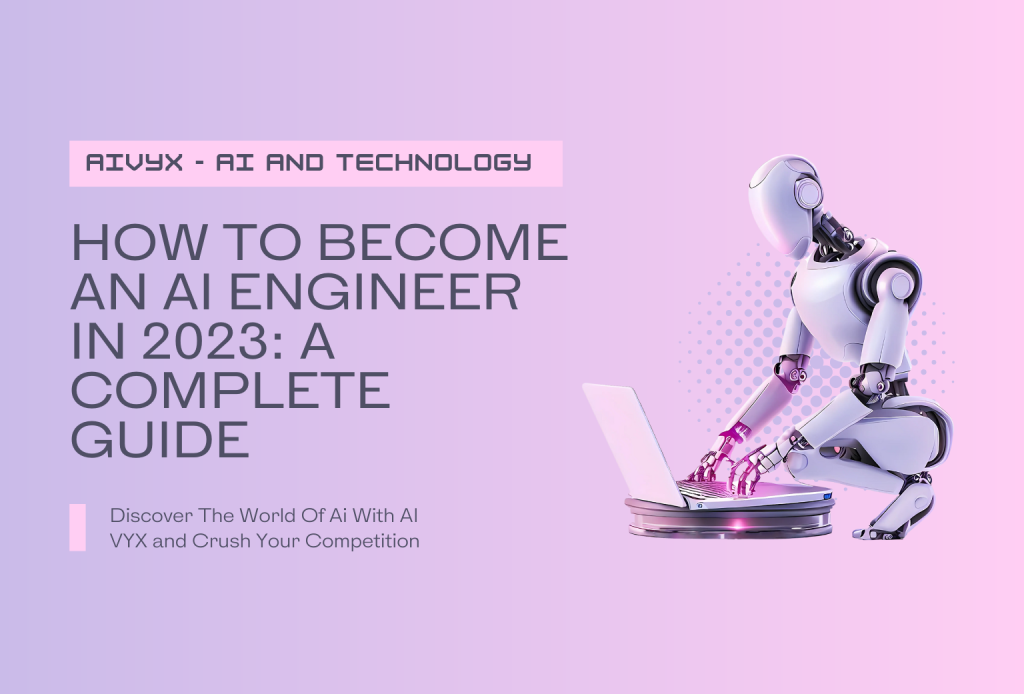Artificial intelligence (AI) is one of the most exciting and rapidly evolving fields of technology today.
AI engineers are responsible for developing applications and systems that use AI to solve complex problems and enhance human capabilities.
AI engineers can work on a variety of domains, such as machine learning, natural language processing, computer vision, robotics, speech recognition, and more.
If you are interested in becoming an AI engineer, you might be wondering what steps you need to take to achieve your goal.
In this blog post, we will provide you with a complete guide on how to become an AI engineer in 2023, covering the following topics:
What is AI engineering and why is it important?
What skills and qualifications do you need to be an AI engineer?
How to learn AI engineering online or offline?
How to gain practical experience and build a portfolio of AI projects?
How to prepare a resume and apply for AI engineering jobs?
What are the best practices and tips for succeeding as an AI engineer?
By the end of this blog post, you will have a clear understanding of what it takes to become an AI engineer and how to start your journey today. Let’s get started!
What is AI Engineering and Why is It Important?
AI engineering is the process of designing, developing, testing, deploying, and maintaining applications and systems that use artificial intelligence techniques to perform tasks that normally require human intelligence.
AI engineering combines computer science, mathematics, statistics, data science, and engineering principles to create solutions that can learn from data, make decisions, and interact with humans and other systems.
AI engineering is important because it has the potential to transform various industries and sectors, such as health care, education, finance, entertainment, transportation, security, and more.
AI engineering can help improve efficiency, productivity, quality, accuracy, safety, accessibility, and innovation.
AI engineering can also create new opportunities for businesses and individuals, as well as address some of the global challenges and issues that we face today.
According to a report by PwC, AI could contribute up to $15.7 trillion to the global economy by 2030.
According to a report by LinkedIn, AI engineering was one of the most in-demand jobs in 2020.
According to a report by ZipRecruiter, the average salary of an AI engineer in the U.S. was $164,769 in 2021.
As you can see, AI engineering is a lucrative and rewarding career choice that offers many benefits and opportunities for growth and development.
If you are passionate about technology and want to make a positive impact on the world with your skills and creativity, then becoming an AI engineer might be the perfect option for you.
What Skills and Qualifications Do You Need to Be an AI Engineer?
To be a successful AI engineer, you need to have a combination of technical skills and soft skills that will enable you to create effective and reliable AI solutions.
Here are some of the most important skills and qualifications that you need to be an AI engineer:
Programming Skills
You need to be proficient in one or more programming languages that are commonly used for AI development, such as Python, and Java.
You also need to be familiar with various frameworks and libraries that facilitate AI development, such as TensorFlow, PyTorch, Keras, Scikit-learn, OpenCV, NLTK, etc.
Data Science Skills
You need to be able to collect, process, analyze, visualize, and interpret large amounts of data using various tools and techniques.
You also need to be able to apply statistical methods and machine learning algorithms to extract insights and patterns from data.
You also need to be able to evaluate the performance and accuracy of your models using appropriate metrics and methods.
Mathematics Skills
You need to have a solid foundation in mathematics, especially in linear algebra, calculus, probability, statistics, optimization, logic, etc.
These topics are essential for understanding the theory and implementation of various AI techniques and algorithms.
Engineering Skills
You need to be able to design, develop, test, deploy, and maintain scalable, robust, secure, and efficient AI systems using various tools and platforms.
You also need to be able to follow best practices and standards for software engineering, such as version control, documentation, debugging, testing, code quality, etc.
Domain Knowledge
You need to have a good understanding of the specific domain or industry that you are working on, such as health care, finance, education, etc.
You need to know the business goals, challenges, opportunities, and requirements of your domain. You also need to know the relevant data sources, standards, regulations, and ethics of your domain.
Soft Skills
You need to have a set of interpersonal and communication skills that will help you work effectively with others, such as clients, stakeholders, managers, colleagues, etc.
You need to be able to communicate clearly and persuasively, both verbally and in writing.
You also need to be able to collaborate, cooperate, and coordinate with others in a team. You also need to be able to adapt, learn, and innovate in a fast-changing environment.
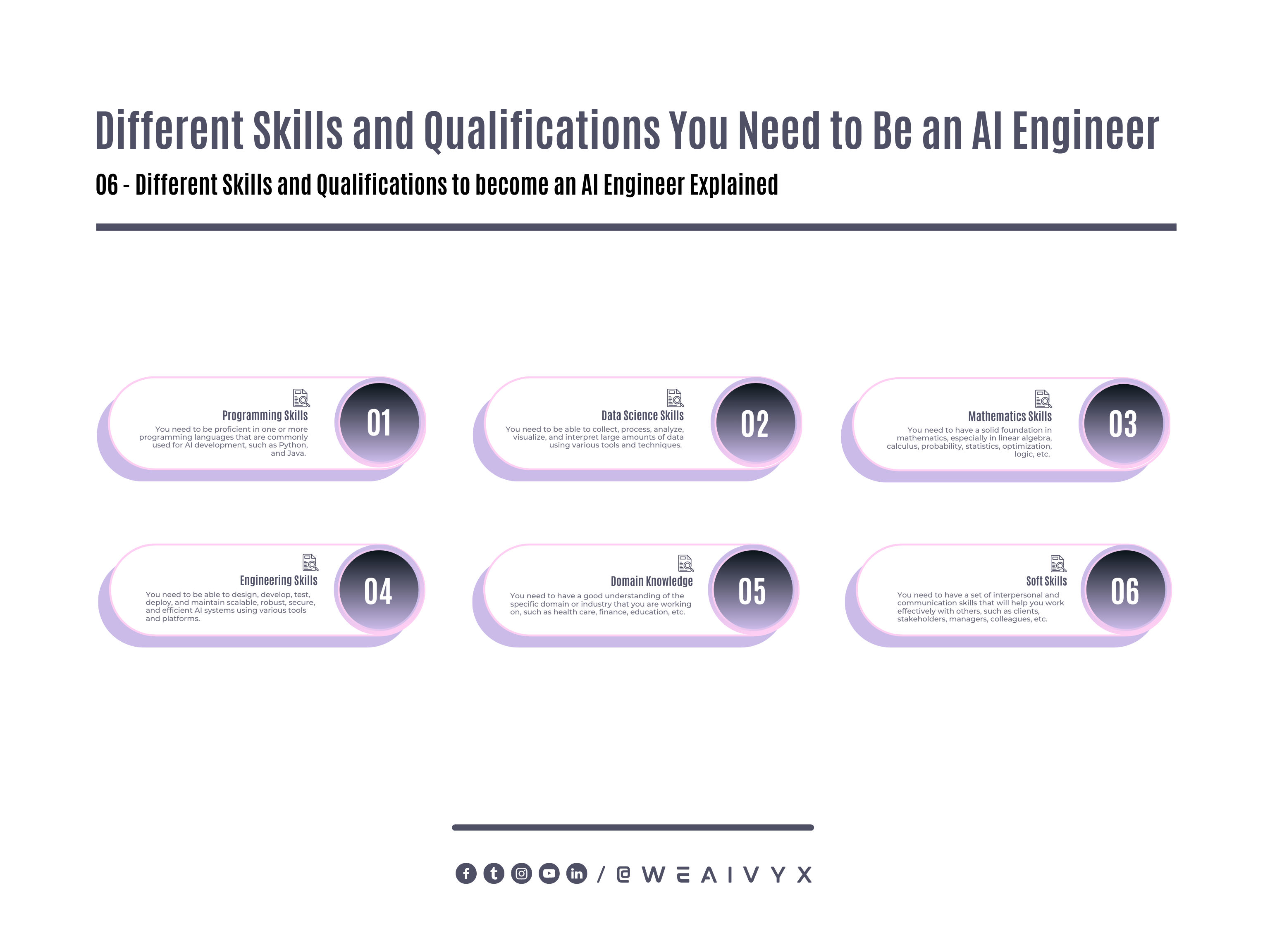
These are some of the core skills and qualifications that you need to be an AI engineer.
However, depending on the specific role and project that you are working on, you might also need to acquire some additional or specialized skills and qualifications.
For example, if you are working on natural language processing (NLP), you might also need to have some linguistic skills and knowledge. If you are working on computer vision, you might also need to have some image processing skills and knowledge.
Therefore, it is important to keep updating and expanding your skills and qualifications as an AI engineer.
You can do this by taking online courses, reading books and blogs, watching videos and podcasts, attending workshops and webinars, joining online communities and forums, participating in competitions and hackathons, etc.
How to Learn AI Engineering Online or Offline?
There are many ways to learn AI engineering online or offline. Here are some of the most popular and effective ways that you can choose from:
Online Courses
Online courses are one of the most convenient and affordable ways to learn AI engineering. You can access a variety of courses from different platforms and providers, such as Coursera, Udemy, edX, Udacity, etc.
You can learn at your own pace and schedule, and get feedback and support from instructors and peers.
You can also earn certificates or degrees that can boost your resume and credibility. Some of the most popular online courses for AI engineering are:
[AI Engineering Professional Certificate] by IBM on Coursera
[AI Engineering Professional Certificate] by IBM on Coursera
[Artificial Intelligence A-Z: Learn How To Build An AI] by Kirill Eremenko and Hadelin de Ponteves on Udemy
[Professional Certificate in Machine Learning] by Columbia University on edX
[Artificial Intelligence Nanodegree] by Udacity
Offline Courses
Offline courses are another way to learn AI engineering in a more structured and interactive way.
You can enroll in offline courses from various institutions and organizations, such as universities, colleges, boot camps, training centers, etc.
You can benefit from face-to-face instruction and guidance from experts and mentors. You can also network and collaborate with other learners and professionals in your field.
Some of the most popular offline courses for AI engineering are:
Master of Science in Artificial Intelligence by Northeastern University
Artificial Intelligence Engineer Bootcamp by Springboard
Artificial Intelligence Engineering Course by Simplilearn
Artificial Intelligence Engineering Training by Edureka
Self-Study
Self-study is another way to learn AI engineering at your own pace and preference.
You can use various resources and materials that are available online or offline, such as books, blogs, videos, podcasts, etc.
You can also practice your skills and knowledge by working on projects and challenges that interest you. Some of the most popular resources for self-study are:
Artificial Intelligence: A Modern Approach by Stuart Russell and Peter Norvig
Machine Learning Yearning by Andrew Ng
AI Hub by Google
Kaggle by Kaggle
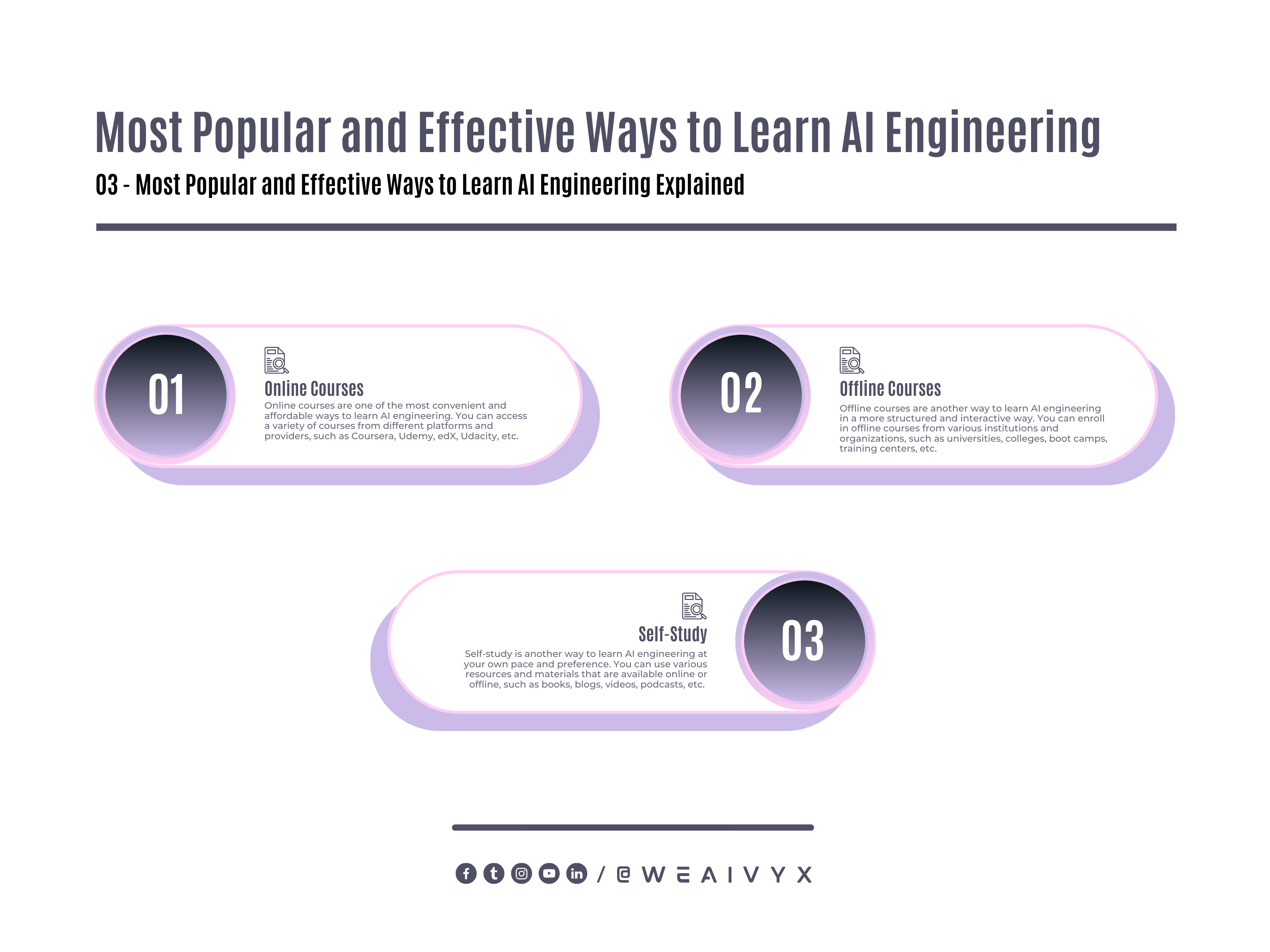
These are some of the ways to learn AI engineering online or offline. You can choose the one that suits your needs, goals, budget, and learning style.
You can also combine different ways to create a personalized learning plan that works best for you.
How to Gain Practical Experience and Build a Portfolio of AI Projects?
One of the best ways to learn AI engineering is by doing.
By working on real-world or simulated AI projects, you can apply your skills and knowledge, test your ideas, solve problems, and learn from your mistakes.
You can also showcase your abilities and achievements, demonstrate your value and potential, and impress your employers and clients.
There are many ways to gain practical experience and build a portfolio of AI projects.
Here are some of the most popular and effective ways that you can choose from:
Online Platforms
Online platforms are one of the most convenient and accessible ways to work on AI projects.
You can find a variety of projects from different domains and levels of difficulty, such as image classification, sentiment analysis, face detection, etc.
You can also get feedback and support from experts and peers, as well as earn rewards and recognition. Some of the most popular online platforms for AI projects are:
Kaggle by Kaggle
Google Colab by Google
DataCamp by DataCamp
Zindi by Zindi
Offline Platforms
Offline platforms are another way to work on AI projects in a more immersive and collaborative way.
You can join or organize offline events, such as hackathons, workshops, meetups, etc., where you can work on AI projects with other learners and professionals in your field.
You can also benefit from mentorship and guidance from experts and sponsors, as well as network and connect with potential employers and clients.
Some of the most popular offline platforms for AI projects are:
MLH by Major League Hacking
AngelHack by AngelHack
Devpost by Devpost
Meetup by Meetup
Personal Projects
Personal projects are another way to work on AI projects that interest you and reflect your passion and creativity.
You can choose a problem or a topic that you want to explore or solve using AI techniques, such as creating a chatbot, a game, a recommendation system, etc.
You can also use your data or find open-source data sets online.
You can also share your projects with others online or offline, such as on GitHub, Medium, YouTube, etc.
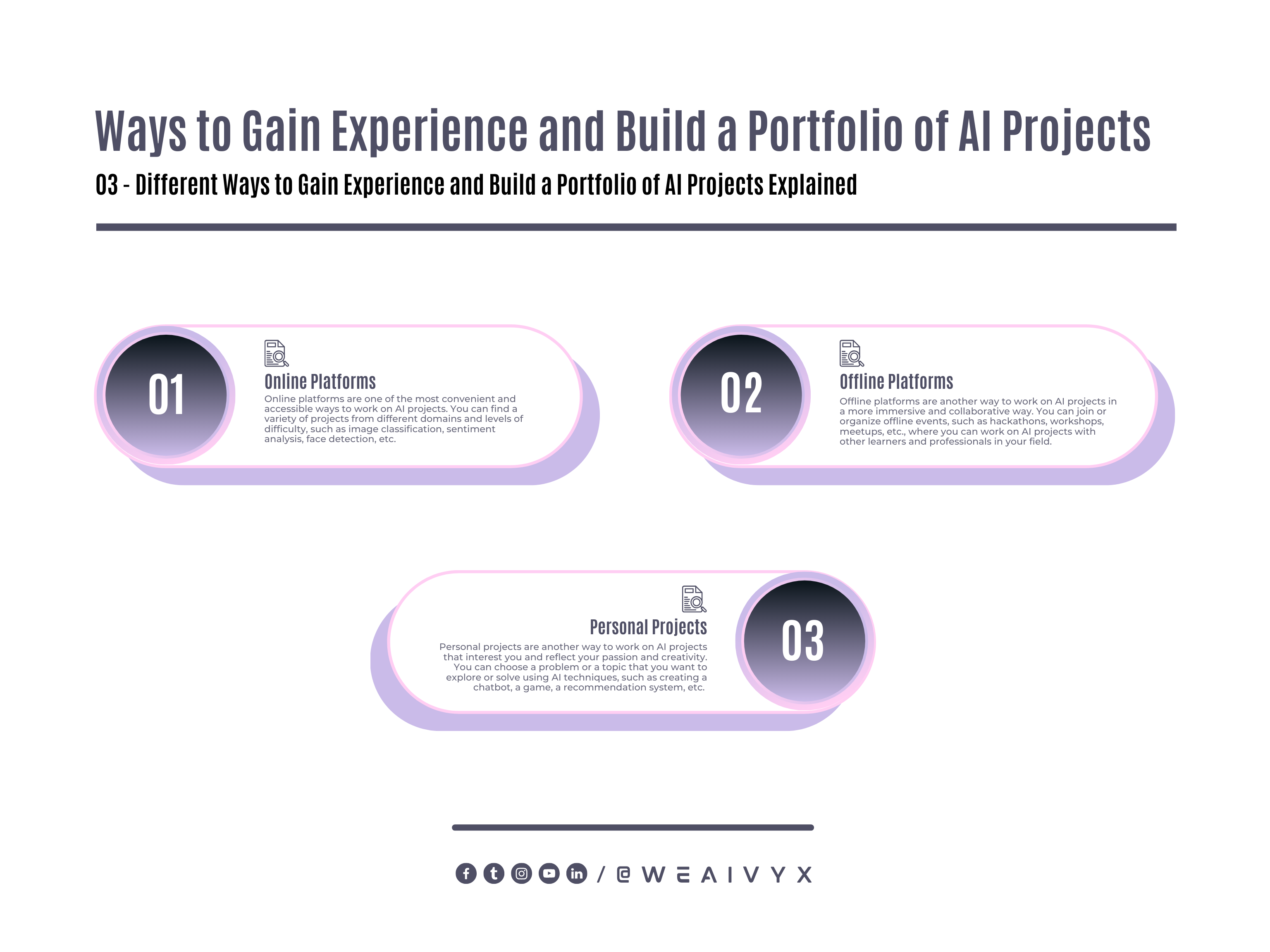
These are some of the ways to gain practical experience and build a portfolio of AI projects.
You can choose the one that suits your needs, goals, resources, and preferences.
You can also combine different ways to create a diverse and impressive portfolio of AI projects.
How to Prepare a Resume and Apply for AI Engineering Jobs?
Once you have acquired the skills and qualifications, and gained the practical experience and portfolio of AI projects, you are ready to prepare a resume and apply for AI engineering jobs.
Here are some tips and steps that you can follow to increase your chances of landing your dream AI engineering job:
Prepare a Resume
A resume is a document that summarizes your education, skills, experience, achievements, and interests.
It is one of the most important tools that you can use to market yourself and impress your potential employers.
Here are some tips on how to prepare a resume for AI engineering jobs:
Use a clear and professional format and layout that is easy to read and scan.
Highlight your relevant skills and qualifications for the AI engineering role that you are applying for, such as programming languages, frameworks, libraries, tools, algorithms, etc.
Showcase your practical experience and portfolio of AI projects that demonstrate your abilities and achievements in AI engineering.
Include links to your projects online or offline, such as on GitHub, Medium, YouTube, etc.
Emphasize your domain knowledge and industry experience that show your understanding and familiarity with the specific domain or industry that you are applying for, such as health care, finance, education, etc.
Include your education and certifications that show your academic background and credentials in AI engineering or related fields, such as online courses, degrees, certificates, etc.
Mention your soft skills and personal traits that show your personality, attitude, and values as an AI engineer, such as communication skills, teamwork skills, problem-solving skills, creativity skills, etc.
Keep your resume concise and relevant. Avoid including unnecessary or irrelevant information that might distract or confuse your potential employers.
Apply for AI Engineering Jobs
Once you have prepared a resume, you can start applying for AI engineering jobs that match your skills, qualifications, interests, and goals.
Here are some steps on how to apply for AI engineering jobs:
Find AI engineering jobs online or offline. You can use various sources and platforms to find AI engineering jobs, such as job boards, company websites, social media, networking events, referrals, etc.
Research the company and the role that you are applying for. You should learn as much as possible about the company’s mission, vision, values, culture, products, services, customers, competitors, etc.
You should also learn about the role’s responsibilities, requirements, expectations, challenges, opportunities, etc.
Customize your resume and cover letter for each job application. You should tailor your resume and cover letter to highlight your relevant skills and qualifications for the specific job that you are applying for.
You should also show your enthusiasm and interest in working for the company and the role.
Submit your application online or offline. You should follow the instructions and guidelines provided by the company or the platform on how to submit your application.
You should also check your application for any errors or mistakes before submitting it.
Follow up with the company or the platform after submitting your application. You should send a thank-you note or email to express your appreciation and interest in the job opportunity.
You should also keep track of your application status and respond promptly to any requests or updates from the company or the platform.
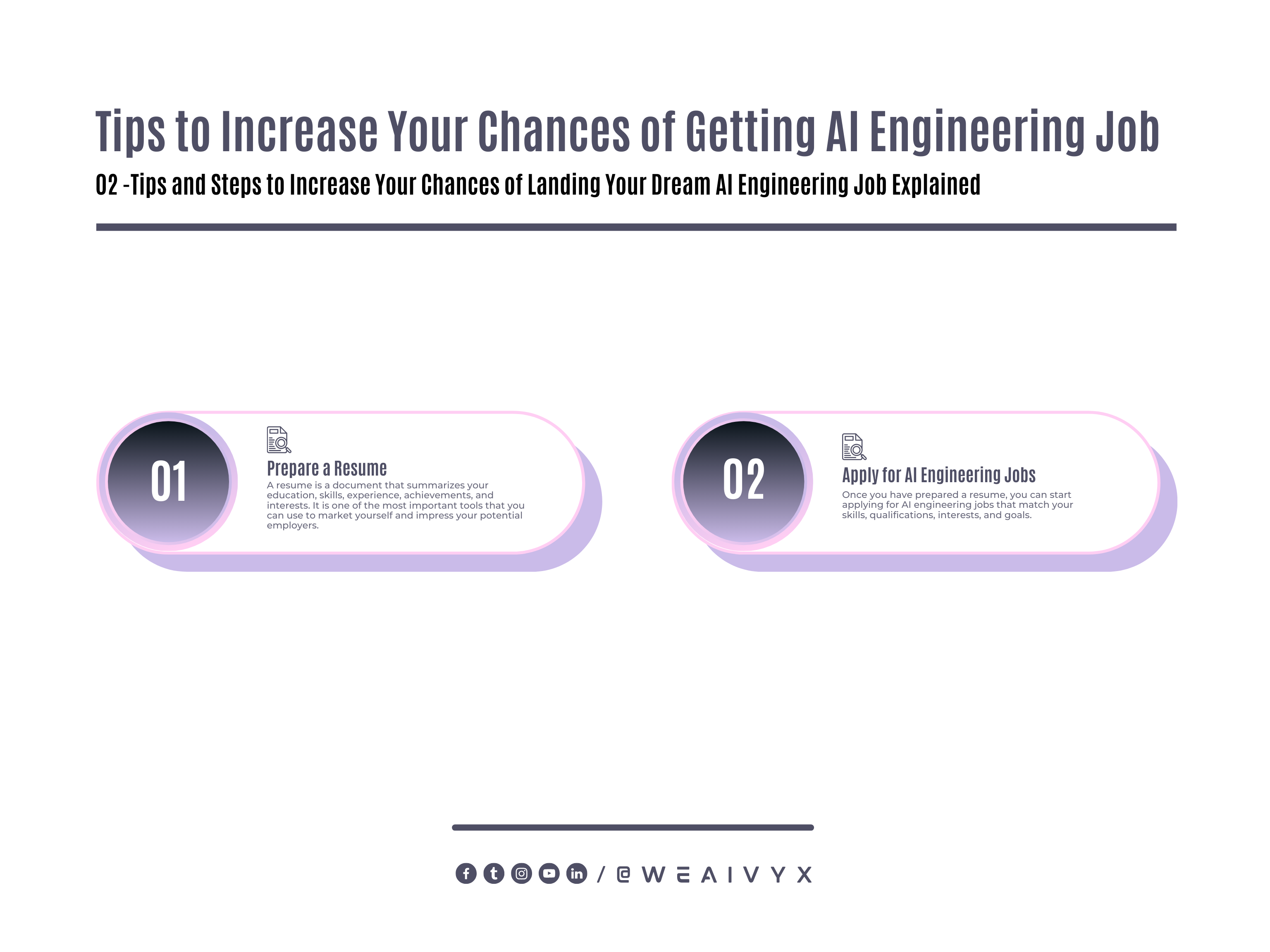
These are some tips and steps on how to prepare a resume and apply for AI engineering jobs. You should be patient and persistent in your job search process.
You should also be open-minded and flexible in considering different options and opportunities.
What Are the Best Practices and Tips for Succeeding as an AI Engineer?
Becoming an AI engineer is not an easy task. It requires hard work, dedication, passion, and continuous learning.
However, it is also a rewarding and fulfilling career choice that offers many benefits and opportunities.
Here are some of the best practices and tips for succeeding as an AI engineer:
Keep Learning
AI engineering is a dynamic and evolving field that requires constant updating and expanding of your skills and knowledge.
You should always be curious and eager to learn new things and improve yourself as an AI engineer.
You should also seek feedback and guidance from others who can help you grow and develop.
Keep Experimenting
AI engineering is a creative and innovative field that requires constant testing and trying of new ideas and solutions.
You should always be willing to experiment with different techniques and methods to find the best ones for your problems.
You should also embrace failures and mistakes as learning opportunities.
Keep Collaborating
AI engineering is a collaborative and interdisciplinary field that requires working with others from different backgrounds and perspectives.
You should always be respectful and supportive of others who can help you achieve your goals.
You should also share your knowledge and experience with others who can benefit from them.
Keep Ethical
AI engineering is a powerful and influential field that can have significant impacts on society and humanity.
You should always be aware and responsible for the ethical implications and consequences of your AI solutions.
You should also follow the ethical principles and guidelines for AI engineering, such as fairness, accountability, transparency, privacy, etc.
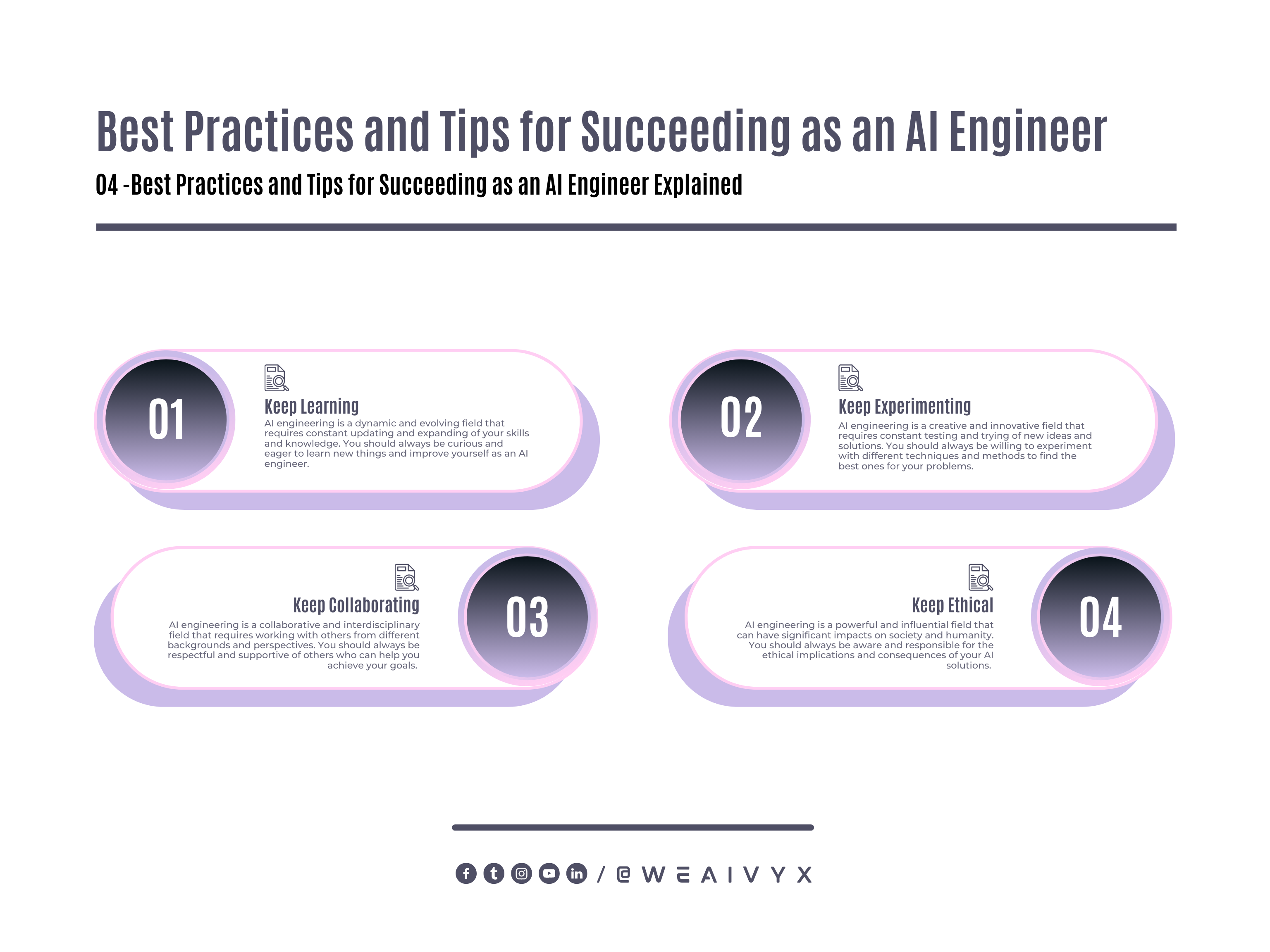
These are some of the best practices and tips for succeeding as an AI engineer.
You should always strive to be a competent, confident, and compassionate AI engineer who can create positive and meaningful value with your skills and knowledge.
Conclusion
In this blog post, we have provided you with a complete guide on how to become an AI engineer in 2023. We have covered the following topics:
What is AI engineering and why is it important?
What skills and qualifications do you need to be an AI engineer?
How to learn AI engineering online or offline?
How to gain practical experience and build a portfolio of AI projects?
How to prepare a resume and apply for AI engineering jobs?
What are the best practices and tips for succeeding as an AI engineer?
We hope that this blog post has helped you understand what it takes to become an AI engineer and how to start your journey today.
AI engineering is a challenging and rewarding career choice that offers many benefits and opportunities for growth and development.
If you are passionate about technology and want to make a positive impact on the world with your skills and creativity, then becoming an AI engineer might be the perfect option for you.
If you have any questions, comments, or suggestions about this blog post, please feel free to share them with us in the comment section below.
We would love to hear from you and help you with your AI engineering journey. Thank you for reading and happy learning!
